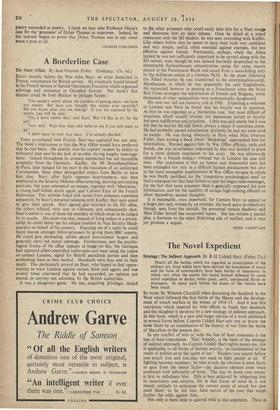A Borderline Case
The Starr Affair. By Jean Overton Fuller. (Gollancz. 13s. 6d.) EIGHT months before the War John Starr, an artist domiciled in France, volunteered for British service. He eventually found himself in the French section of Special Operations Executive which organised sabotage and resistance in Occupied Europe. The book's first chapter could be from Buchan or perhaps Sapper : 'You needn't worry about the problem of getting there—we have our means. But have you thought this matter over carefully? Do you know what you are risking? If you are captured by the enemy you will be shot.'
'Yes, 1 quite realise that,' said Starr, 'But I'd like to try for the job.'
'Very well. Wait four days and write to me if you still want to go.'
I don't have to wait four days. I've already decided.'
Twice pLrachuted into France, Starr was captured but not shot. The book's implication is that the War Office would have preferred that he had been. He quickly won his captors' respect by ability to withstand pain and by-his lack of servility during lengthy interroga- tions. Indeed throughout he aroused unexpected but not incredible sympathy from the Germans. Kieffer, the SS Sturmbannftihrer in/ Paris, later hanged for his part in the execution of six uniformed Commandos, three times disregarded orders from Berlin to have him shot. Starr, after fairly rigorous imprisonment, was then employed in the Security Defence office lettering, drawing and making portraits, but soon attempted an escape, together with Madeleine,' a young half-Indian secret agent, and Colonel Faye of the French Resistance. This attempt failed and, saved from summary execution apparently by Starr's personal relations with Kieffer, they were asked to give their parole. Starr agreed and returned to the SD office, the others refused, were sent to Germany and subsequently shot. Starr's action is one of those the morality of which tends to be judged by its results. His claim was that, instead of lying useless in a prison- camp, he could better use his unique position at Nazi Security Head- quarters on behalf of his country. Enjoying use of a radio he could boost morale amongst fellow-prisoners by giving them BBC reports. He could give misleading advice about non-existent targets and generally carry out minor sabotage. Furthermore, and the psycho- logical drama of the affair appears to hinge on this, the Germans had captured allied-controlled radio-units and were using the radios to contact London, signal Cot–British parachute, parties and then ambushing them as they landed. Hundreds were thus sent to their death. This particularly preyed on Starr, who hoped to find oppor- tunities to warn London against certain fields and agents and was several times convinced that he had succeeded, an opinion not shared, or anyway not admitted, by the British authorities.
It was a dangerous game. He was acquiring privileges denied to the other prisoners who could easily take him for a Nazi stooge and denounce him on their release. Once he dined at a smart restaurant with the SD leaders: he was seen swimming with Kieffer. Like others before him he seems to have been both very confident and very simple, useful, often essential against enemies, but less effective against friends. Fortunately, perhaps, when the Allies
landed he was not sufficiently important to be carried along with the SD retreat, even though he was instead hurriedly despatched to the abominable Sachsenhausen concentration camp, for some reason placed in the Punishment Block and saved from a mass-killing only by the deliberate action of a German NCO. In the panic following the Allied victories he was transferred to the extermination-camp, Mauthausen, in which he was apparently the only Englishman. He succeeded however in passing as a Frenchman when the Swiss Red Cross arranged the repatriation of French and Belgians, while thousands of other nationalities were systematically slaughtered.
His own war did not however end in 1945. Expecting a welcome in London and Paris he found that his loyalty was in question. At best he was regarded as a 'borderline case,' that most difficult of situations which usually–arouses not passionate hatred or loyalty but mere indifference and irritation. Little was said openly but it was felt that he had let the side down, always a major if unwritten crime. He had probably passed information: probably he had not even tried to escape. He was living obscurely in Paris when Miss Overton Fuller, \then writing a book about Madeleine,' approached him for information. Warned, against hirn by War Office officials, male and female, she was nevertheless impressed by him and decided to press for a more definite conclusion to his story. He, was afterwards cleared by a French military tribunal but in Lcindon his case still rests. Her conclusion is that an honest and resourceful man has been entangled not only in a difficult human predicament but also in the more intangible ramifications of War Office intrigue in which he was finally sacrificed for the 'compulsive psychological need' to find a scapegoat for that fatal failure to spot the bogus radio-messages, for the fact that more prisoners than is generally supposed did pass information, and for the inability of certain high-ranking officials to allow themselves second thoughts.
It is reasonable, even important, for Captain Starr to appeal to a larger jury and, written by an outsider, the book gains in objectivity though, seen from the outside, the personnel remain shadowy and Miss Fuller herself has occasional lapses. She has written a special plea, a footnote to the more dispiriting side of warfare, and it may yet produce a sequel.
PETER VANSITTART


































 Previous page
Previous page